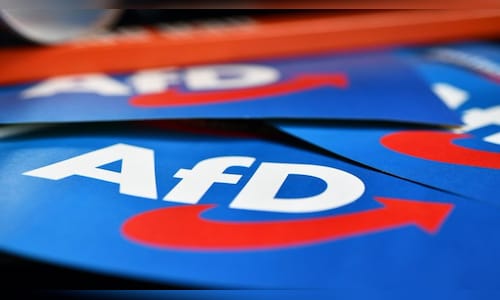The 11-year-old AfD, which has most support in the formerly communist-ruled east, is unlikely to be able to form a state government even if it wins, as it is polling below a majority and other parties refuse to work with it.
But it will be the first time that a far-right party has held the most seats in a German state parliament since World War II and its strength will complicate coalition-building and could allow it to block constitutional changes and appointments of some judges.
In Thuringia, the AfD is gaining 30 percent of the vote, almost ten points ahead of the conservatives in second place, and in Saxony it is tied with them on 30-32 percent. The newly formed far-left Sahra Wagenknecht Alliance (BSW) is in third place in both states.
The strong gains by the two anti-establishment parties portend growing instability in Europe’s largest economy, reflecting a fragmentation of the political landscape that could also complicate efforts to form coherent national governments.
The AfD’s signature issue of migration has been thrust onto the agenda since a knife attack in the western city of Solingen a week ago, in which a 26-year-old suspected Islamic State member of Syrian origin is accused of killing three people.
“We want to put an end to state failure, to the loss of control,” said AfD co-leader Alice Weidel at a campaign event in Dresden on Wednesday. “This can only be achieved with a sustainable change in immigration and asylum policy.”
The BSW, named after its founder, a former communist, also opposes both immigration and military support for Ukraine’s fight against Russian invasion; both parties seek better relations with Moscow.
All three parties in Scholz’s federal coalition are expected to lose votes and two of them may even struggle to reach the 5% threshold needed to enter parliament. Their falling popularity could mean the return of a conservative-led alliance in next year’s national election.
Business leaders have warned of the threat posed by far-right extremism to Europe’s largest economy, saying it could make it harder to attract skilled labour and investment. German politicians say populist rhetoric has fuelled physical attacks.
ANTI-ESTABLISHMENT PARTIES ARE ON THE RISE
The AfD in Thuringia is led by Bjoern Hoecke, a man considered so extreme by some in the party that they tried to oust him.
The former history teacher called Berlin’s memorial to the Holocaust of European Jews by Nazi Germany a “monument of shame” and was condemned earlier this year for using a Nazi slogan at a party rally.
Although voting patterns in the once-communist-ruled east are still distinct 30 years after reunification because of weaker party loyalties and greater economic pessimism, Sunday’s election provides a glimpse of trends at the national and even European level.
As in France and elsewhere, the rise of anti-establishment parties in the wake of the coronavirus pandemic, Russia’s invasion of Ukraine and the ensuing cost-of-living crisis are complicating coalition-building and governability.
“Everything is going wrong in the established parties – we need a new direction,” said Thomas Leser, who was in the audience at the BSW rally in Suhl, Thuringia.
The BSW, which was created in January and combines social conservatism and far-left economics, is expected to win up to 20% and 15% respectively in Thuringia and Saxony, which could put it in a position of power.
“I’m also not happy that a party in which there are right-wing extremists and Nazis is gaining strength,” party leader Sahra Wagenknecht said at a rally this week. “But who is responsible for the fact that so many people in our country vote for such a party out of anger and desperation?”
“It is the politicians who have ruled the people for years,” he said.
Both the AfD and the BSW, which together win 40-50% of the vote in Thuringia and Saxony but only 23-27.5% nationwide, oppose arming Ukraine, a particularly sensitive issue in eastern Germany, and argue that kyiv should make peace with Moscow.
“When it comes to arms supplies, diplomatic solutions must be sought here, no matter who,” said Gerhard Iffert at a BSW event in Eisenach.
The party only gets 7-9% of the vote nationwide, but with Scholz’s Social Democrats having dropped from 25.7% in the 2021 election to 15-16%, every vote counts.
Disclaimer:
The information contained in this post is for general information purposes only. We make no representations or warranties of any kind, express or implied, about the completeness, accuracy, reliability, suitability or availability with respect to the website or the information, products, services, or related graphics contained on the post for any purpose.
We respect the intellectual property rights of content creators. If you are the owner of any material featured on our website and have concerns about its use, please contact us. We are committed to addressing any copyright issues promptly and will remove any material within 2 days of receiving a request from the rightful owner.

